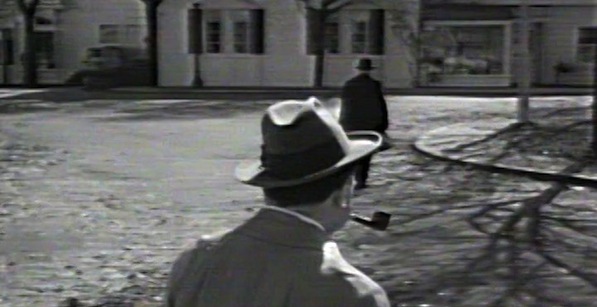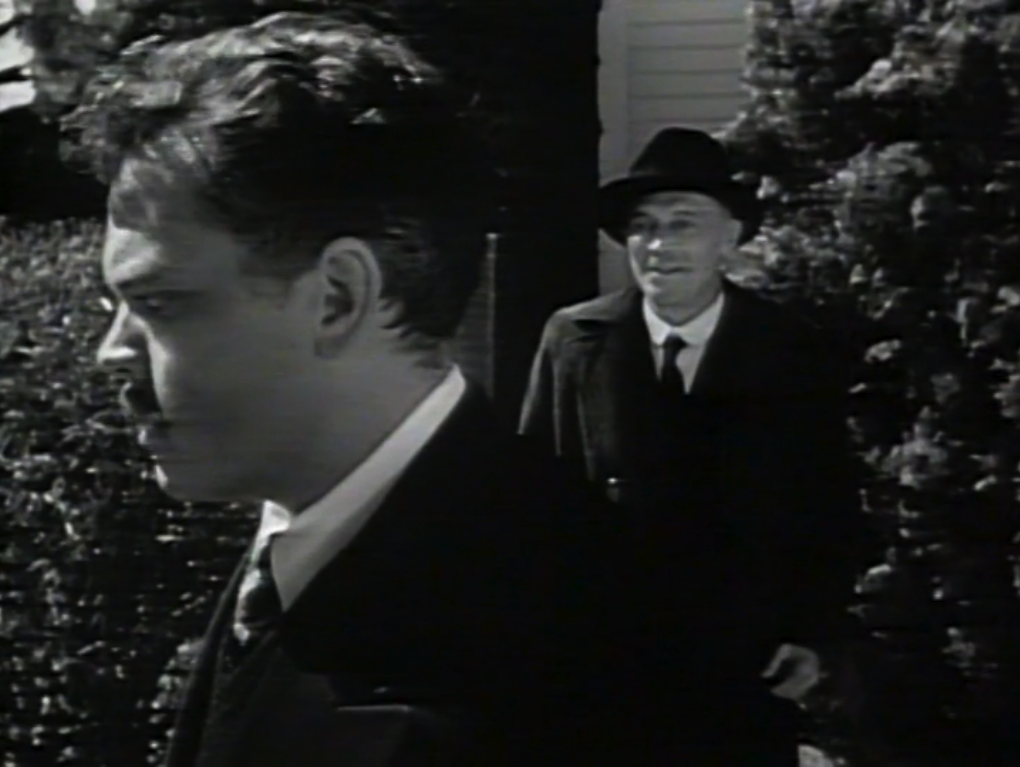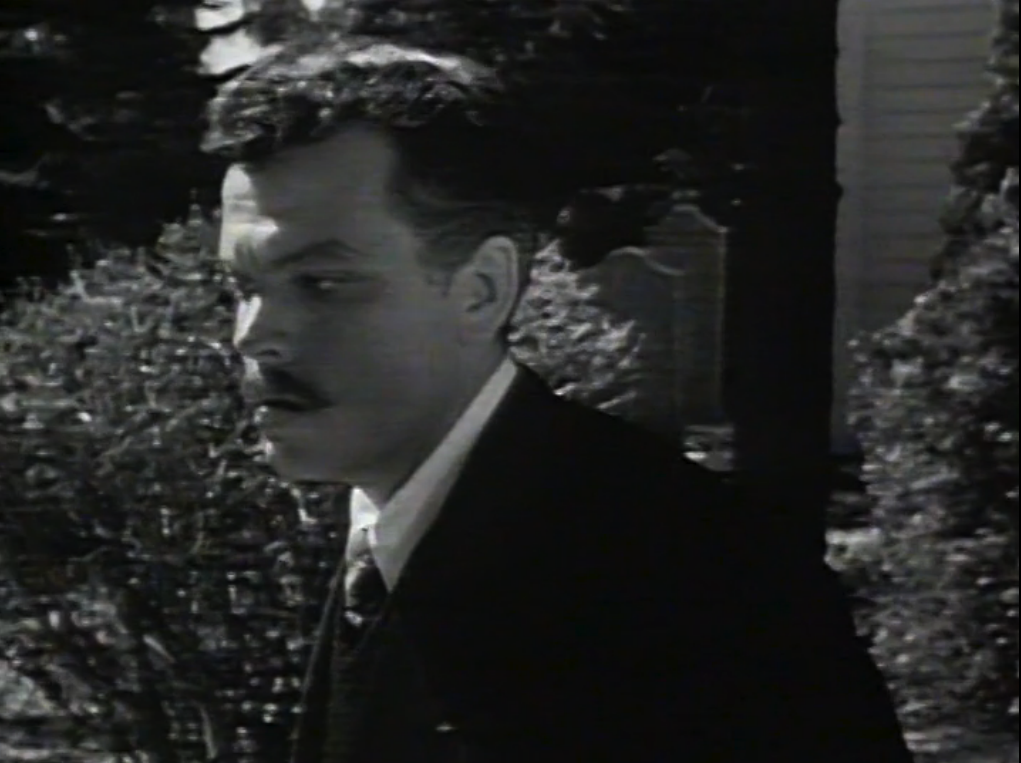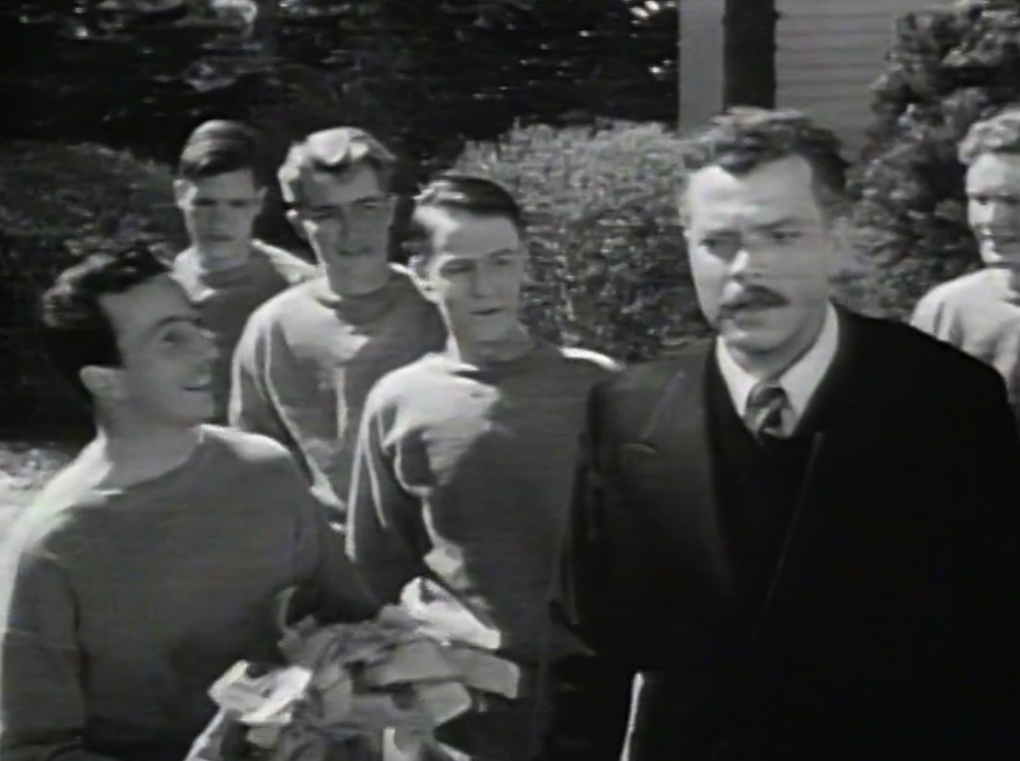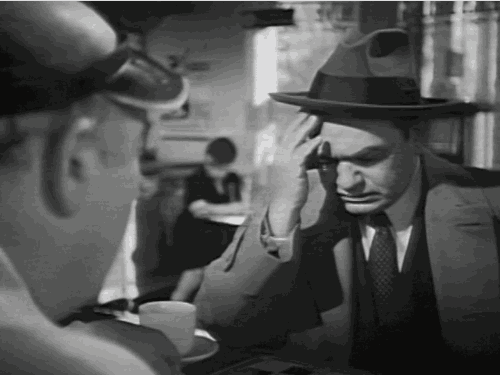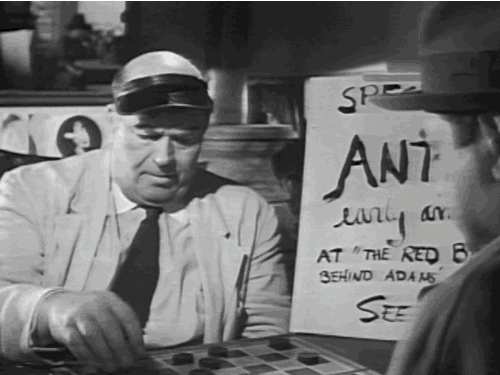There are two strangers in Orson Welles’ The Stranger (1946). The more obvious stranger is Franz Kindler, played by Welles himself. Living under the false identity of Charles Rankin, a professor and prep school teacher, Kindler is in fact a fugitive Nazi living out a quiet life with his unsuspecting fiancée Mary Longstreet (Loretta Young) and her family in smalltown Connecticut. The first time we see Kindler, he walks home towards the camera from the right. As he nears the camera, he stops dead in his tracks at the sound of another man’s voice.
[Editor’s note: “Gestures” is a new column that analyzes a film’s general themes by pinpointing and discussing a specific moment.]
The voice belongs to Konrad Meinike (Konstantin Shayne), an old associate—now repentant—who has hunted Kindler down in the hope he might persuade his fellow Nazi to confess his past crimes. As Meinike calls out from behind a bush, we see Kindler in profile, and his face is immediately one of alarm. While other directors may have been tempted to cut to a more frontal angle of the character’s face so as to show a change in tone, Welles holds the shot and his own position within it. Here is a character, and actor (and a character who is acting), who will command the frame—who will elude detection precisely by assuming unthinkably brazen roles: the loving husband and family man, the prep school teacher, the town spokesman.
Indeed, Welles conveys everything we need to know about Kindler in a matter of seconds. The man who later in the film is said to “have a passion for anonymity” seizes up at the sound of his old friend’s voice. But he is also quick to think. Welles squints his eyes, as if to attune his hearing to the precise meaning of Meinike’s words, and to sharpen his senses for any deeper implication between them. Has his old associate been followed? Is he being set up? Is this the day his past deeds catch up with him? The speed with which he digests Meinike’s presence—and all the possible explanations for it—tells us Kindler has been living in unspoken expectation of such a confrontation. Welles shows that our villain’s daily pretense has not dulled him into lethargy. For this moment especially, he has been prepared.
Welles, as he often did throughout his career, conveys severity with something between a full-on frown and a middle-distance stare. Here, he adds shifty eyes to the formula, and there’s a slight stammer in the way he tells Meinike not to come any nearer: “Meinike, we mustn’t be s-s-seen talking together.” The small way in which Kindler slurs seen disrupts his otherwise fast and articulate speech. It’s as if the thought of being seen momentarily makes the word itself too dangerous to mutter. “Go back into the church,” Kindler continues, “into the woods—the woods! Follow the path, I’ll meet you there.”
Meinike disappears. Kindler remains in profile, fixed to the spot. As played by Welles, the character dares not turn his head to look behind him, as if doing so would confirm to any onlooker shiftiness, and to himself his own paranoia. Still, Welles darts his eyes this way and that, checking his periphery for what might be a sign of further threat.
Just as he begins to compose himself, a group of male students surround Kindler. In a flash, he switches up, greeting them with the smile and joviality they clearly expect of him. Walking along the path with the boys, he turns to face the camera more frontally, using their collective presence as an excuse to shift his vantage point and instinctively survey his surroundings more fully. Even as he laughs at their wisecracks, his cheeriness is suddenly too insincere to resist the growing alarm within. From this point on, Kindler is a marked man.
But he isn’t the only stranger in town. As we learn in a very early scene, Meinike has been released from jail in the hope that he will lead authorities to Kindler. The man on the fugitive’s tail is Wilson (Edward G. Robinson), who works for the Allied Commission for the Punishment of War Crimes. Having become famous for playing ruthless gangsters, Robinson had by this point changed his onscreen persona to something of a quiet man, whose acute, arrow-straight morality often resulted—as it had in Double Indemnity (1944)—in tireless quests for truth and justice. (He wasn’t finished with tough guys, though, as his turn in 1948’s Key Largo would attest.)
This is a film all about acting. We know from the first scene in which Wilson appears here that his character has a similarly tireless ruthless streak (“You can threaten me with the bottom pits of hell and still I insist! This obscenity must be destroyed, do you hear me, destroyed!”). And although later in the film Wilson will out himself as the lawman he is (note the way he gets to the point with Mary Longstreet when he accuses her of “shielding a murderer”), Robinson’s approach to such a role contrasts effectively against that of Welles. He too is playing a part; he too is welcomed as a stranger in town.
Indeed, what drives the first half of the film stems from this tension between two outsiders keeping up appearances in pursuit of ulterior motives. But it’s not just the contrast in performances per se, but the nature in which Robinson’s character begins his investigation. Left for dead by Meinike upon arriving into town, Wilson eventually comes to and makes his way to the local convenience store to buy a bottle of aspirin. In there, he converses with the storekeeper and some locals, making enquiries as to whose wedding is taking place in the church opposite. Helping himself to a coffee, Wilson agrees with the storekeeper to a game of checkers. He makes idle small talk during the game. Though the small talk pertains to the ceremony, we can’t be sure if Wilson is aware that it is Kindler who’s getting married.
This is the joy in watching an actor like Robinson. Throughout the scene, we’re unable to tell if he’s fully recovered from the would-be fatal blow dealt to him by Meinike in an earlier scene (and is thus faking its affect on his mental faculties), or if he’s genuinely slow on the uptake. As an inquisitor, Wilson appears to be clumsy—too much of a nuisance to evade detection. When the storekeeper asks him why he’s in town, Wilson struggles, seemingly, to think up a disguise. In comparison to Kindler and the sharpened preparation conveyed by Welles, Wilson stumbles his way through the first real conversation he has in the film. Fumbling for answers, beaten easily at checkers and rubbing the bump on his head, he convinces everyone—including even the audience—of his credulity.
Robinson was visibly small in size. His height made his more unforgiving characters—such as Rico in Little Caesar (1931)—all the more dangerous, suggesting as it did that his temper was an unhinged psychological response to what he perceived to be some kind of physical deficiency. But in The Stranger, Robinson’s size suggests another kind of vulnerability. And in the convenience store, as he stands there rubbing his head allowing the storekeeper to beat him at checkers, his character’s clumsiness appears to put him at a strong disadvantage against the more palpably cunning Kindler.
Wilson is the underdog whose detective style might be likened to Zui Quan, the martial arts technique known as “drunken fist” that Jackie Chan made famous in Drunken Master (1978). Feigning a kind of inebriated stupor in order to lure enemies into a false sense of security, the technique’s apparent clumsiness disguises a heightened sense of balance and discipline. You’d be a fool to doubt Wilson. Kindler doesn’t.

